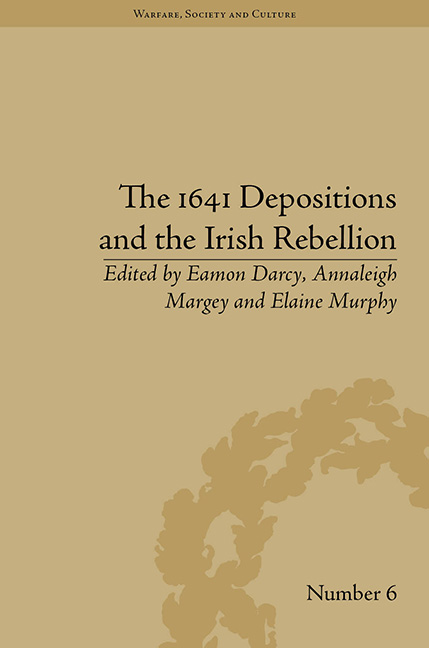Book contents
- Frontmatter
- CONTENTS
- Dedication
- Acknowledgements
- List of Contributors
- List of Figures and Tables
- List of Abbreviations
- Preface
- Introduction
- Part I The Outbreak of the Rebellion
- Part II Social Aspects of the Rebellion
- 5 ‘In Monies and Other Requisites’: The 1641 Depositions and the Social Role of Credit in Early Seventeenth-Century Ireland
- 6 1641 and the Ulster Plantation Towns
- 7 The Social Order of the 1641 Rebellion
- 8 ‘Rogues, Villaines & Base Trulls’: Constructing the ‘Other’ in the 1641 Depositions
- Part III Political and Military Aspects of the Rebellion
- Conclusion: The Rebellion in Text and Context
- Notes
- Index
7 - The Social Order of the 1641 Rebellion
from Part II - Social Aspects of the Rebellion
- Frontmatter
- CONTENTS
- Dedication
- Acknowledgements
- List of Contributors
- List of Figures and Tables
- List of Abbreviations
- Preface
- Introduction
- Part I The Outbreak of the Rebellion
- Part II Social Aspects of the Rebellion
- 5 ‘In Monies and Other Requisites’: The 1641 Depositions and the Social Role of Credit in Early Seventeenth-Century Ireland
- 6 1641 and the Ulster Plantation Towns
- 7 The Social Order of the 1641 Rebellion
- 8 ‘Rogues, Villaines & Base Trulls’: Constructing the ‘Other’ in the 1641 Depositions
- Part III Political and Military Aspects of the Rebellion
- Conclusion: The Rebellion in Text and Context
- Notes
- Index
Summary
Sitting before two officers of the Cromwellian army, Alice MacDonnell, the Countess Dowager of Antrim, was questioned about her conduct during the troublesome period of October 1641 to May 1642. She had fled her home in late May 1642 due to the approach of two Scottish armies. One force, under the command of General Monro, approaching by land, was of little consequence. The other army situated off the coast of Antrim and under the command of the ‘McCallins’, posed a greater problem. The ‘McCallins’ or the Campbells were ‘alwaies Enemies to the macDonnells’. In January 1642, in a pre-emptive strike, a force led by Manus O'Cahan and some of the MacDonnells raided the fort at Portnaw in County Antrim and allegedly massacred eighty soldiers. In retaliation, the Scottish forces stationed in East Ulster descended on Island Magee and attacked the indigenous Catholic population. In her examination, MacDonnell wished to avoid implicating herself in the attack at Portnaw. To do so she consistently refused to answer any question on the issue: ‘Being several times told That that Answere was not pertinent to the Question; shee at Last Answered That if shee were to be hanged shee could not Answer the said Question any otherwise.’ Asked whether she protected any of the ‘British’ in the vicinity she replied that ‘her house was full of Irish Scotch & English’ but she could not remember their names. Over the course of her interrogation, the two inquisitors, Richard Brasier and Thomas Coote, focused on MacDonnell's failure to protect ‘British’ settlers. MacDonnell, however, remained defiant and tenacious in her defence. After being asked several times whom she had attempted to protect from being murdered she replied ‘that shee was no souldier to go out and defend them’.
MacDonnell's testimony provides today's historian with a valuable keyhole through which it is possible to see the multifaceted machinations of the social order in early modern Ireland. Paradoxically, Alice MacDonnell both confronted and participated in the social order during her examination. She did not act like a timid lady before her two male interrogators and consistently challenged their authority, thereby upsetting traditional concepts of gender power relations.
- Type
- Chapter
- Information
- The 1641 Depositions and the Irish Rebellion , pp. 97 - 112Publisher: Pickering & ChattoFirst published in: 2014



